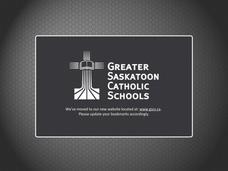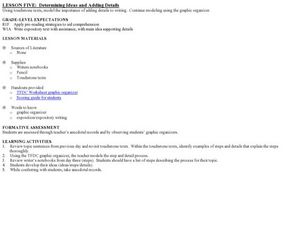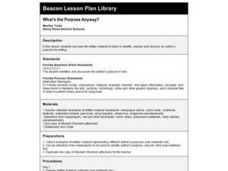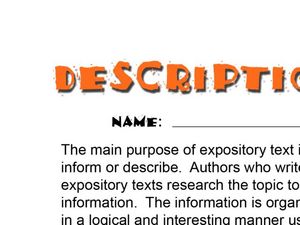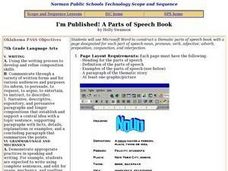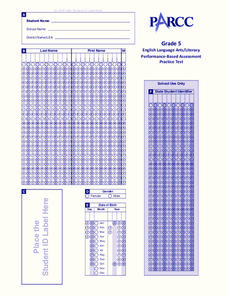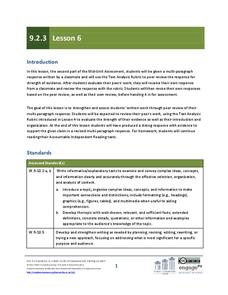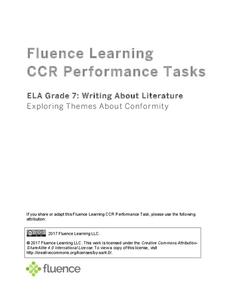EngageNY
Determining Cascading Consequences Using The Omnivore’s Dilemma: Hunter-Gatherer Food Chain
Focusing on the consequences of the hunter-gatherer food chain that Michael Pollan discusses in The Omnivore's Dilemma, teams work together to create hunter-gatherer food chain consequences charts. Next, scholars view other groups'...
Curated OER
Basic Five Paragraph Essay
Introduce your young writers to the basic five-paragraph essay. The fun part of this presentation is the stance of the essay used to illustrate the format. The writer of the model essay contends that the Twilight series is a terrible...
EngageNY
End of Unit Assessment: Drafting the Informative Consumer Guide
Not all sandwiches are edible. Scholars use a Quote Sandwich graphic organizer to draft the written content of their informative consumer guides. Additionally, they view a mini-lesson plan on formal writing.
Curated OER
Five-Paragraph Essay
The great thing about this presentation on the traditional five-paragraph essay is the color coding. Each aspect of the essay is followed by a concise description and an example. Then a complete paragraph is presented with the key...
Curated OER
Writing Essays
Students compose expository essays. In this written communication lesson, students examine paragraphs from sample expository essays and then discuss the attributes of well-written essays prior to writing their own expository essays.
Curated OER
Reporting from Multiple Sources-The Role of Dogs in Three Societies
Students synthesize information from various resources. In this expository essay writing lesson plan, students view three video segments and take notes. Students analyze notes in peer groups and write an expository essay.
Curated OER
Using Graphology to Teach Traditional Writing
Introduce your class to the narrative, descriptive and expository forms of writing. In groups, they discuss the personality of the author while graphing the characteristics after reading different examples from the same writer. To end...
Curated OER
Determining Ideas and Adding Details
A handy TFDC (topic/fact/detail/conclusion) graphic organizer (included) allows young writers to outline and record their main ideas and supporting details in the prewriting phase. They then continue to add details to the topic sentences...
Curated OER
What's the Purpose Anyway?
Examine author's purpose in newspaper articles, comic books, cookbooks, encyclopedias and other forms of written materials. Working in groups, middle and high schoolers read teacher-selected articles and write an explanation of the...
Curated OER
Responses to Literature
Middle and high schoolers hone their writing skills by reading Rikki-Tikki-Tavi and the poem Sarah Cynthia Sylvia Stout Would Not Take the Garbage Out. They fill out a graphic organizer (included here), and use the organizer to write an...
Curated OER
Description Paragraphs
Young writers use the provided Halloween-themed template to record information gathered after researching a topic related to the October holiday. Six different expository text structures are suggested as a guide; however, information on...
Curated OER
Africa-Compare and Contrast Paper
Explore Africa with your fourth, fifth, and sixth graders. Researchers complete a Venn diagram comparing two places in Africa using their textbook as a resource. Then, they write an expository paper comparing and contrasting the chosen...
Curated OER
I'm Published! A Parts of Speech Book
Reinforce the importance of the writing process with this publication lesson. Elementary and middle schoolers compose a parts of speech book which includes one page each for nouns, pronouns, verbs, adjectives, adverbs, prepositions,...
Scholastic
Outlining Main Ideas and Details
Practice outlining and evaluating expository writing in this lesson. After discussing main ideas and seeing examples, young writers go through a sample outline and discuss the way to properly format a piece of writing. They then create...
Curated OER
Mealworms
Crawl into the world of the darkling beetle with this scientific investigation. Watch as the insects move through the larval, pupal, and adult stages of life, recording observations along the way. Discuss the necessities of life as young...
Curated OER
Performance-Based Assessment Practice Test (Grade 4 ELA/Literacy)
Track the progress of your fourth graders' reading and writing skills with this practice Common Core assessment. Based on a collection of six reading passages that include narrative stories, poetry, and a series of...
EngageNY
Grade 9 ELA Module 3, Unit 3, Lesson 1
The opening exercise in this instructional unit introduces class members to the writing process they will follow to craft an informative, expository research paper that addresses their research question. To begin, writers are asked to...
Infobased Learning
Bloom's Literature: How to Write about Nineteen Eighty Four
A good prompt is hard to find, especially ones that encourage application, analysis, synthesis, and evaluation of a text. Help is here in the form of a prompt list for George Orwell's Nineteen Eighty Four that offers essay topics that...
Curated OER
Performance-Based Assessment Practice Test (Grade 5 ELA/Literacy)
Check in on the development of your fifth graders' reading and writing skills with this Common Core-designed assessment. Given a series of six reading passages ranging from narrative stories to informational texts, young...
EngageNY
Grade 9 ELA Module 2, Unit 3, Lesson 6
As part of a mid-unit assessment, class members exchange their draft of a multi-paragraph essay with a classmate, review their partner's writing using the provided text analysis rubric, and evaluate the strength of evidence, the...
Fluence Learning
Writing About Literature: Exploring Themes About Conformity
Feeling the pressure to confirm is something any adolescent can relate to. Explore an essential theme with a response to literature assessment that prompts learners to identify main ideas with evidence and supporting details.
Curated OER
Lesson 10:Media
Second graders share their expository writing pieces. In this expository writing lesson plan, 2nd graders create a visual media product to give to their parents to invite them to an author celebration. They bring props and share their...
Curated OER
Understanding Types of Writing
Students analyze the types of writing and answer questions about the writing genres. In this writing types activity, students define and discuss the types of writing including expository, descriptive, persuasive, technical, and narrative...
Other popular searches
- Expository Writing Prompts
- Expository Writing Template
- Expository Writing Lessons
- Expository Writing Exercises
- How to Expository Writing
- Voice in Expository Writing
- Expository Writing Rubrics
- Expository Writing Exemplars
- Expository Writing Peer Edit
- Writing Expository Essays
- Writing Expository
- Writing Expository Paragraph



